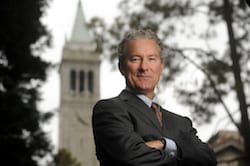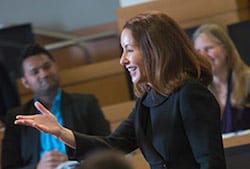2024 Berkeley Haas Year in Review

During a busy last year as dean, Rich Lyons continues to question the status quo, co-authoring a new case study that takes a candid look at his culture initiative and whether the School’s Defining Leadership Principles will endure.
The study, “The Berkeley Haas School of Business: Codifying, Embedding, and Sustaining Culture,” co-authored with Prof. Jenny Chatman, offers a detailed history of the dean’s initiative, its successes, and the gaps that remain. As all effective cases do, it also asks provocative questions about what will happen when Haas’ chief purpose officer passes the leadership mantle in June 2018.
“The acid test of effective leadership is how well an organization does when a leader is gone,” says Chatman, the Paul J. Cortese Distinguished Professor of Management. “There is some risk that once the champion of the Defining Principles leaves that the principles themselves will evaporate in some way, or at least become less forceful.”
Chatman, an expert on organizational culture, was an early champion of the Defining Principles—now referred to as the Defining Leadership Principles: Question the Status Quo, Confidence without Attitude, Students Always, and Beyond Yourself.

Dean Rich Lyons (Photo: Noah Berger)
“The rudder of the ship”
Keeping the principles going for generations has been top-of-mind for Lyons, who made sure that they were prominent in the job announcement for his replacement.
The Haas School Board, whose input will be important for the selection of the new dean, is one crucial link to future support for the principles. Haas board member Michael Gallagher said that the hiring process will be critical to the dean’s legacy.
“The dean is the rudder of the ship, and if that person comes in and wants to redefine the culture, it would be a grave mistake,” he said. “The dean should be selected on his or her ability to understand, to support, and to have a passion for advancing these Defining Leadership Principles. If that happens, they will be sustainable for a long, long time.”

Prof. Jennifer Chatman
The case study grew out of a 2016 lunch meeting between Lyons and Chatman. In addition to being Chatman’s longtime friend and teaching colleague, Lyons had read some of Chatman’s research on culture and developed a deep appreciation for how powerful a tool it can be for organizations.
He was further convinced of culture’s significance after a 20-month stint as the Chief Learning Officer at Goldman Sachs, a position that he left to rejoin Haas as dean in 2008. In recent years, Lyons has been a regular guest speaker on the topic of culture in one of Chatman’s courses in the UC Berkeley Executive Leadership Program.
Chatman says she suggested they co-author the case study because the process behind implementing the culture initiative was ideal for such an analysis, and because she felt that creating an official record of the principles’ development was important to the school’s history and evolution.
The principles’ growing influence
Since 2010, when they were first codified, the Defining Leadership Principles have proven a quantifiable success. About 75 percent of students from all three MBA programs and the undergraduate program cite them as a strong reason for choosing Haas. Similarly, more than 90 percent of alumni surveyed from the past decade said they were familiar with the principles and use them when navigating both their careers and personal lives.
In the MBA programs, the principles influence everything from who is admitted to key elements of the curriculum. For staff, the Annual Outstanding Staff Awards were altered to reflect the principles, among other changes.
While students, staff, and alumni have strongly embraced the principles, faculty acceptance has varied.
“Some of the faculty have always been on board with the principles, and others— including significant skeptics—have come around,” Chatman said. “But I’m still not sure that faculty live by them day to day. Filling in those gaps is, I think, an opportunity for this dean in his final year and for the next dean.”
Perhaps the biggest hurdle for Lyons was how to bring the principles into the faculty’s world, where success is measured by research and teaching—and skepticism is part of the job. As Prof. Steven Tadelis put it, “soft” things like culture, especially 10 years ago, were viewed by some as “fluff and irrelevant.”
Yet Tadelis said that his work experiences with eBay and Amazon helped change his view of the principles. “Before I had that practical wisdom of working at companies, I couldn’t fully grasp the objective of the Defining Principles,” he said. “I now think these are core to being a successful team member in any organization.”
“The kind of people they want to fund”
Feedback from the Berkeley Haas community continues to encourage Lyons that the principles will live on—in part because they have been implicit in the school’s identity for decades.
Stephanie Fujii, former assistant dean of MBA admissions, said over time the fit of the students admitted to Haas increasingly aligned with the principles. Venture capitalists, Lyons said, tell him that “our principles describe the kind of people they want to fund.”
“Recruiters tell me that when they hire for senior positions, it comes down to fit over skills nearly every time,” Lyons added.
Both Lyons and Chatman view the case study as one way to ensure that needed work continues to happen this year and under a new dean. Lyons has already identified 12 “culture champions”—including faculty and staff—who meet regularly to discuss ways to continue the culture-building work.
Lyons and Chatman also plan to follow up with a second case study chronicling what was actually done in Lyons’ final year to further cement the culture.
“Cultures need to change over time; while I don’t feel the four principles should change anytime soon, the specifics of how they impact the way we do our work should change,” said Lyons. “There are a lot of institutions that maintain very strong cultures over many leader successions because organic support is so strong.”
Posted in:



